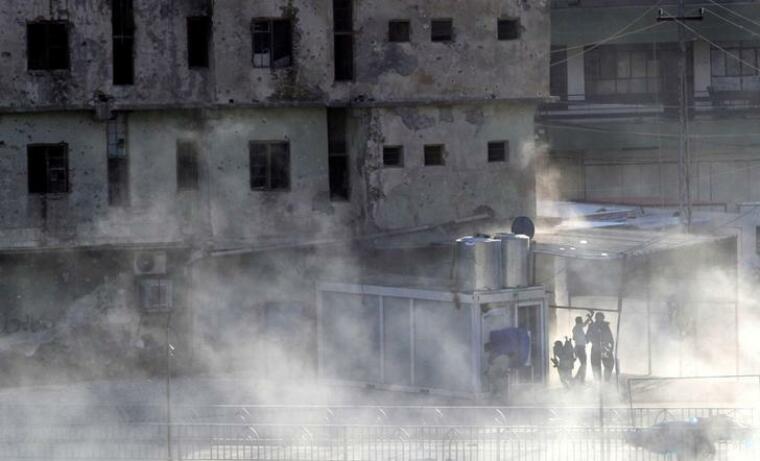Captured ISIS militants say they now regret joining terror group

Islamic State militants, who are now incarcerated at a Kurdish-run prison in Northern Iraq, are expressing their regret for joining the terror group.
In an interview with CNN, three ISIS fighters admitted that they played a role in an attack committed by the jihadist group in Kirkuk in October. The attack, which resulted in the deaths of 96 people, was considered as a distraction from the operation taking place in Mosul.
Laith Ahmed, who used to work as a carpenter, said that he was enticed to join the group because of a promising salary.
"I made a mistake. I don't know how to read or write. Everything I did was wrong," he admitted.
The Kurdish authorities told CNN that the 26-year-old Laith worked for the terror group as an inghamisi or a suicide fighter and led a group of five men in the attack on Kirkuk. He claims to have no knowledge about his position as an inghamisi.
He said that he and the other men were tricked into carrying out the attack. He said that the terror group just handed them their weapons and dropped them off in specific locations and left. He was captured and restrained by local residents until the Kurdish security forces took him into custody.
Akram Ahmed, 22, was approached by an ISIS member while he was working in his cell phone repair shop. He admitted that he once liked the idea of a nation being ruled by Islamic laws.
"The Caliphate persuaded us with religion. I am a student of sharia law in university. So these ideas are convincing to me," he said.
He was told to go on a reconnaissance and surveillance mission ahead of the assault. He filmed key government and security buildings with the use of his phone. It has been confirmed that many of the sites he photographed were attacked by ISIS.
Akram said that he now regrets joining the group and he still hopes that he can rejoin the community again someday.
"Now if I walk in my street people will say I killed their children. If I go to the mosque people will say he killed my children. If I come to get married, people will say he killed our children," he said.
Abdelrahman al-Azy, who lived in the city of Kirkuk, said that he pledged allegiance to the jihadist group using his mobile phone. He was the one who distributed the salaries to the militants and their families.
He considered himself as a strict Muslim and said that he once believed that those who do not pledge to the caliph were not Muslims.
Abdelrahman attested that he no longer believes in the caliphate and he does not want to be associated with ISIS anymore. However, he still believes that the jihadists group will still survive even if they lose Mosul.
"In Iraq they (ISIS) will survive because there are so many cells. Just look in Kirkuk. There were so many cells. In my opinion even if they lose Mosul they will exist in Iraq," he said.
It was reported last August that most ISIS recruits have little knowledge about Islam. About 70 percent listed their knowledge of the religion as "basic" while 24 percent said they have an "intermediate" knowledge. Only five percent considered themselves as advanced students of Islam.
 Christians don't have to affirm transgenderism, but they can’t express that view at work: tribunal
Christians don't have to affirm transgenderism, but they can’t express that view at work: tribunal Archaeology discovery: Medieval Christian prayer beads found on Holy Island
Archaeology discovery: Medieval Christian prayer beads found on Holy Island Presbyterian Church in America votes to leave National Association of Evangelicals
Presbyterian Church in America votes to leave National Association of Evangelicals Over 50 killed in 'vile and satanic' attack at Nigerian church on Pentecost Sunday
Over 50 killed in 'vile and satanic' attack at Nigerian church on Pentecost Sunday Ukrainian Orthodox Church severs ties with Moscow over Patriarch Kirill's support for Putin's war
Ukrainian Orthodox Church severs ties with Moscow over Patriarch Kirill's support for Putin's war Islamic State kills 20 Nigerian Christians as revenge for US airstrike
Islamic State kills 20 Nigerian Christians as revenge for US airstrike Man who served 33 years in prison for murder leads inmates to Christ
Man who served 33 years in prison for murder leads inmates to Christ


 Nigerian student beaten to death, body burned over ‘blasphemous’ WhatsApp message
Nigerian student beaten to death, body burned over ‘blasphemous’ WhatsApp message 'A new low': World reacts after Hong Kong arrests 90-year-old Cardinal Joseph Zen
'A new low': World reacts after Hong Kong arrests 90-year-old Cardinal Joseph Zen Iran sentences Christian man to 10 years in prison for hosting house church worship gathering
Iran sentences Christian man to 10 years in prison for hosting house church worship gathering French Guyana: Pastor shot dead, church set on fire after meeting delegation of Evangelicals
French Guyana: Pastor shot dead, church set on fire after meeting delegation of Evangelicals ‘Talking Jesus’ report finds only 6% of UK adults identify as practicing Christians
‘Talking Jesus’ report finds only 6% of UK adults identify as practicing Christians Mission Eurasia ministry center blown up in Ukraine, hundreds of Bibles destroyed: 'God will provide'
Mission Eurasia ministry center blown up in Ukraine, hundreds of Bibles destroyed: 'God will provide' Church holds service for first time after ISIS desecrated it 8 years ago
Church holds service for first time after ISIS desecrated it 8 years ago Burger King apologizes for 'offensive campaign' using Jesus' words at the Last Supper
Burger King apologizes for 'offensive campaign' using Jesus' words at the Last Supper Uganda: Muslims abduct teacher, burn him inside mosque for praying in Christ’s name
Uganda: Muslims abduct teacher, burn him inside mosque for praying in Christ’s name